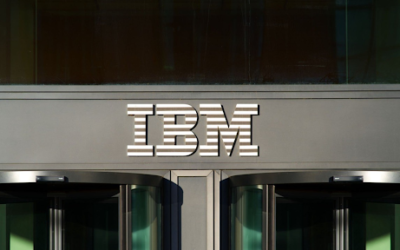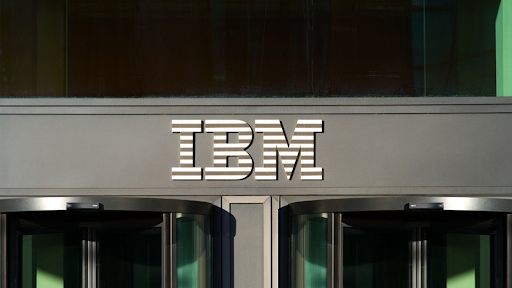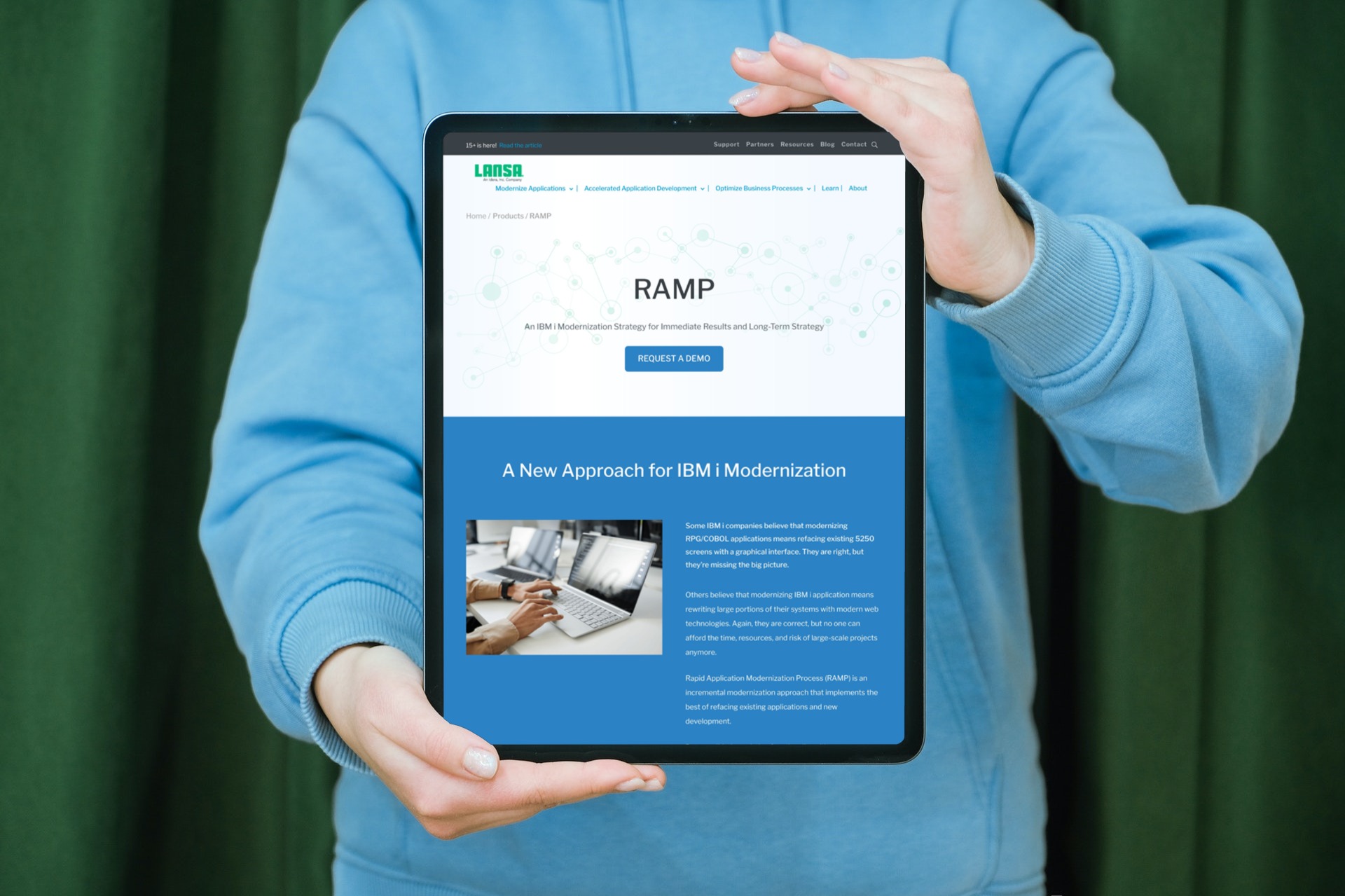When it comes to enterprise systems, IBM i continues to be a powerful and reliable operating environment. Its rock-solid architecture, 99.9% uptime, transaction speed, and database (DB2) capabilities make it an excellent option for today’s businesses.
However, IBM i users still run many of its applications via the RPG code format. Although it is rock-solid and powerful, the RPG code outputs to monolithic 5250 green screens. It is a stark, old fashioned look, especially in contrast with today’s modern expectations for web software.
There is a clean modern solution to this old fashioned look. LANSA’s low-code application development platform puts you back in control by accelerating the development and delivery of enterprise web and mobile applications. With LANSA you can typically build apps up to 10 times faster than using traditional methods. LANSA makes your team more productive with its unique low-code language that converts your developers into full-stack developers.
That said, to leverage IBM i capabilities and still keep up with constantly evolving customer demands, here are three must-have IBM application modernization solutions that we will cover in this article. They include the IBMi spooled files manager, a browser-based DB2 query tool, and a 5250 host automation solution.
Explore more features of IBM Series I from our previous article: “11 Things About IBMi You May Not Have Known.”
Also, check out this video for more information:
What is IBM i Spooled Files Management?
Are you guilty of leaving spooled files unattended? Most IBM i administrators are. And this often leads to reports remaining in an output queue until someone mistakenly deletes or clears the queue in a bid to free up disk space.
In addition, the way you handle spooled files directly impacts you and your end-user. In this case, aXes offers a powerful spooled file management solution to boost your IBM i modernization.
This solution allows you to manage IBM i (System i, iSeries, or AS/400) spool files and output queues in a web browser. You can also view, print, download, and delete reports from a computer or tablet device using a browser.
aXes also provides full control of output queues and spool files with all the functionality of the IBM queue and spool commands, including commands like hold and release.
Learn more about how IBM aXes (sometimes misspelled as IBM aXis) can help you solve inefficiencies in your workplace and what benefits you will get if you leverage it.
How Can I Simplify Spool File Management?
aXes comes with all the resources you need for easy file management, starting with its point-and-click web user interface. Output queues and spool files are displayed as lists on a web page, simplifying the selection and viewing of reports. With a few mouse clicks, you can accomplish most tasks. What’s more, you don’t need to know the IBM i queue and spool commands making the system much more useable and easily learned.
How Can I Create and Save Searches For Output Queues and Spool Files?
With the aXes’ spooled file management solution, you can search for output queues or spool files by creating filters. For example, search for output queues by queue name and library and search for spool files using combinations of search criteria such as user, job, output queue, and date range. Filters speed up finding what you are looking for by reducing the list of queues or spool files.
Additionally, you can save your filters. This way, you can quickly and easily rerun frequently used filters without redefining your search criteria every time.
How Can I Convert spool files to PDF, HTML, and Text?
The aXes file management solution allows you to convert spool files to PDF, HTML, and text, giving you more choice on using the spool file information. For example, converting a spool file to PDF is a convenient way to send it as an attachment to an email.
In addition, this solution offers advanced printing features, such as AFP, IPDS, and Enhanced SCS, that can take your modernization to the next level by enabling you to work with spool files that include barcodes, background images, and logos.
Let’s look at the benefits of utilizing IBM workplace modernization services and how it can help your organization keep up with rapidly changing customer demands.
What is the Browser-Based DB2 Query Tool?
One of the most common DB2 tasks is retrieving information. aXes offers a modern and powerful solution to modernize this process. The aXes DB2 query tool provides a unique solution for building and running queries against IBM i (System i, iSeries, or AS/400) DB2 databases from a browser. You can query DB2 tables, print the query results, and/or copy the results into applications like Microsoft Excel.
With this tool, you can create distributed SQL database queries for DB2 databases and any ODBC/JDBC accessible data sources.
What’s more, building queries with aXes requires no knowledge of or experience with SQL. You can build a query via point-and-click by displaying a list of tables, choosing columns, and adding selection filters. aXes generates the SQL code that is used to retrieve the data from the database. Using the query editor, experienced users can extend the generated SQL code or write SQL code from scratch.
How Can I Save DB2 Queries and Recall Them for Later Use?
With the aXes DB2 query tool, you can save and recall DB2 queries for later use, allowing you the luxury of easily rerunning frequently used queries by setting the selection filters (e.g., a date range) and running the query.
How Can I View Query Results in a Browser?
The aXes DB2 query tool also facilitates the digital transformation processes. On that note, it provides easy access to real-time query results via a web page. It also uses IBM i database authorization so that users only see data they are authorized to view.
How can I do 5250 Host Integration automation?
aXes host integration solution allows users to Integrate 5250 applications with web and line-of-business applications. This way, you can automate exchanging data with 5250 applications. This is done by leveraging an application programming interface (API) that developers can use to write programs that automatically operate applications written with RPG or COBOL.
You can leverage this solution to simulate a person’s actions entering data on screens in a 5250 application. This feature makes it possible to integrate existing 5250 applications with .NET, Java, or other 5250 applications without changing the source code of your 5250 applications.
aXes caters to a wide range of automation options with versions of the API for .NET for Windows, Java for IBM i and Windows, and RPG for IBM i. The .NET version is written in managed code, the Java version, in Java SE, and the RPG version is a wrapper around the Java API.
How Can I Integrate existing 5250 applications with new applications?
The aXes host integration interface allows new applications to use 5250 applications to retrieve data and/or update data.
What is the best solution for modernizing IBMi applications?
Low-code development platforms arm IT with the ability to rapidly develop and deliver enterprise applications. Compared to traditional application development, low-code greatly minimizes hand-coding in multiple languages. It also maximizes code re-use, reduces risk and eliminates the need to find elusive and costly full-stack developers. The only way to increase IT output – besides hiring more staff – is to provide your current staff with better development tools.
Now that we have looked at three must-have powerful IBM i modernization tools, feel free to check out how you can “Rapidly Accelerate Your IBM i 5250 Digital Transformation With Modern UIs” which sets you up for sustainable growth in a continuously and rapidly changing environment.
Are you ready to modernize your IBM i 5250 applications? Contact us now to get started.























